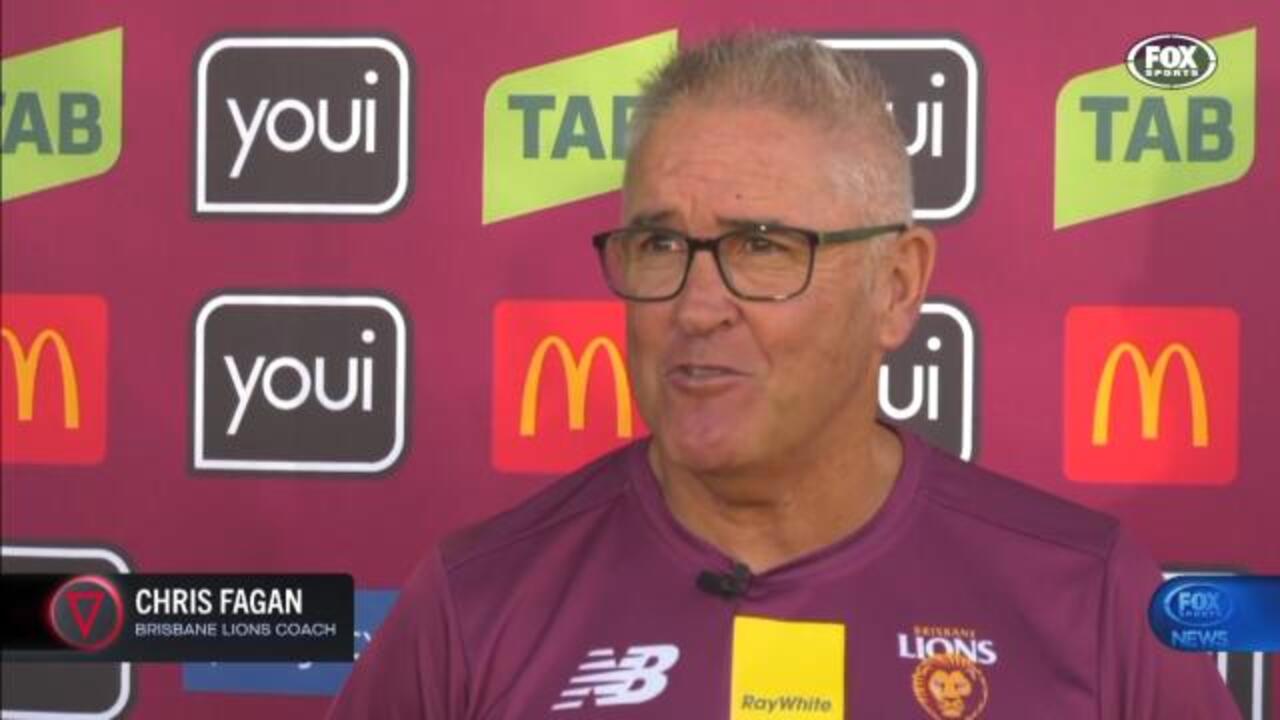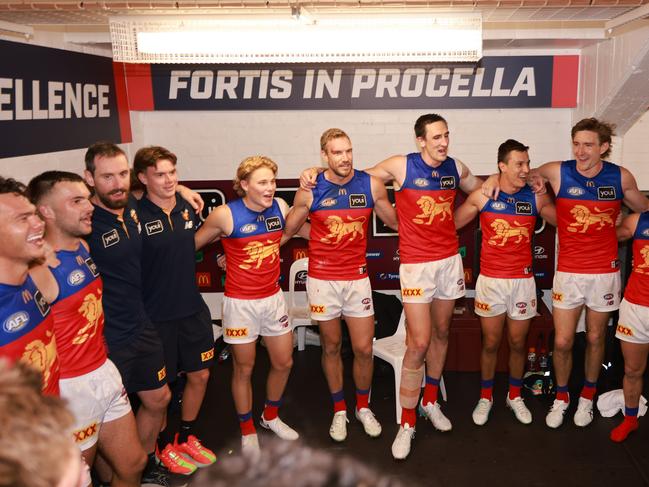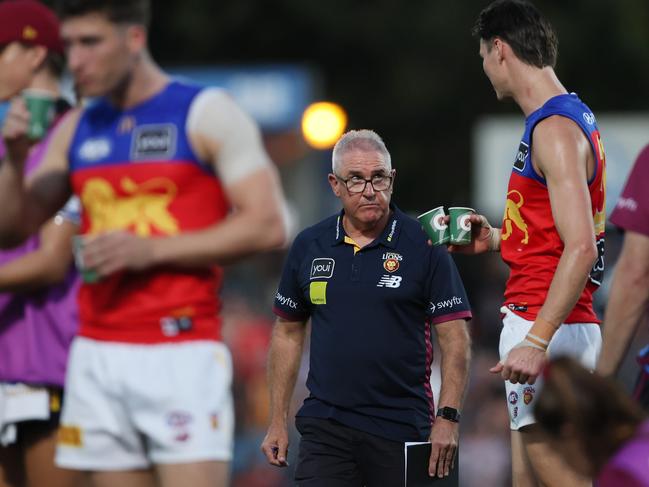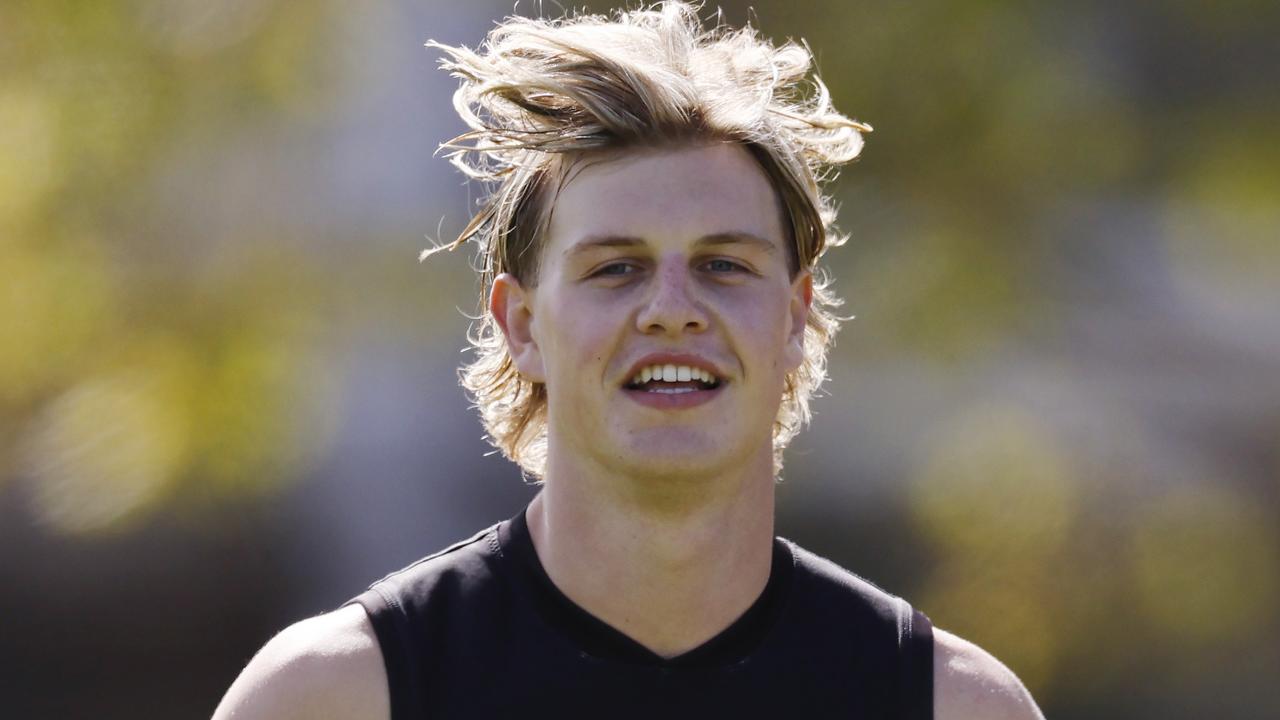New grit? Why Brisbane Lions have been ‘comeback kings’ for 12 months
Don’t call them the ‘comeback king’ Lions now, they’ve done it for a year, writes Callum Dick. The last 12 months, Brisbane has become a perfect test case in handling crisis on and off-field.

AFL
Don't miss out on the headlines from AFL. Followed categories will be added to My News.
The title of ‘comeback kings’ has been bestowed on the Brisbane Lions after yet another backs-to-the-wall triumph over the Western Bulldogs in Gather Round.
But the brilliant fighting spirit of Chris Fagan’s side had been evident long before last weekend’s fifth straight second-half comeback.
And the traditional Easter Thursday blockbuster between Brisbane and Collingwood comes at a perfect time to reflect on a rollercoaster 12 months that once threatened to derail a proud club which has instead come out the other side stronger than ever.
Fagan’s rope-a-dope Lions are the talk of the football world for their incredible mental fortitude to repeatedly wrest back victory from the jaws of defeat.

The reigning premiers are a perfect 5-0 to start the season, despite falling behind by at least four goals in each of their matches so far this year.
Last weekend they trailed by as many as 39 points against the Bulldogs, only to kick 13 of the final 16 goals to surge to the top of the AFL ladder.
And that trademark fighting on-field mentality has also been reflected off-field, given this time 12 months ago things were not going nearly as well for the boys from Brisbane.
In the corresponding Easter Thursday fixture last year, a 0-3 Collingwood breathed life into its season with a convincing 20-point victory.
It marked Brisbane’s second-consecutive home defeat, having gone unbeaten at the Gabba the entirety of the previous season, and consigned the Lions to their own 0-3 start.
Four days later the club was on the back foot after reports surfaced of an off-season trip to the United States that had some suggesting a fracture in the playing group was the reason for its poor start.

Co-captain Harris Andrews and football boss Danny Daly fronted media and strenuously denied there was disharmony within the group.
“It’s easy to be a leader when you’re playing in a prelim and going off to a grand final – it’s easy to do the showcase there,” Andrews said at the time.
“But as a leader … we have some challenges at the moment with our own performance and our ability to drag ourselves out of that will be a great challenge.
“I still have plenty of confidence in this group.”
The club publicly denied the reports and then closed ranks. It exorcised whatever demons it needed to and two months later re-emerged as a powerhouse. The end result? A long-awaited premiership.

For Brisbane, the past 12 months has been a perfect case study in how to handle a crisis at a football club. Strong leadership, self-belief and putting people first.
Beyond the Lions’ poor start and off-field dramas, the club was also dealing with a compounding injury list.
Keidean Coleman was out for the season with an ACL injury and in the days leading up to the Collingwood clash, high-profile recruit Tom Doedee reinsured his ACL.
Before the end of the first quarter in the QClash, Darcy Gardiner and Lincoln McCarthy had added their names to the list of Lions ACL injuries. Brandon Starcevich was ruled out in the warm-up with a calf injury and Noah Answerth concussed late in the match.
We would come to find out months later that Fagan had contemplated taking a step back after the QClash, with the combination of Brisbane’s poor start to the season and a minor health scare leaving the coach questioning whether he was in the right head space to continue.
At the time this was all unbeknown to the rest of the football world and after Brisbane’s round 11 loss to Hawthorn, that saw it slump to 4-6-1, some even began to question whether the club’s leadership should look to replace the head coach.
But chief executive Greg Swann and chairman Andrew Wellington were staunch in their defence of the man who had dragged the Lions from the foot of the ladder to perennial premiership contenders.

They knew Fagan’s worth, of his close relationship with the playing group and the winning football formula that was still very much part of the Lions’ DNA.
In the week leading up to the home game against GWS last year, Swann told this masthead installing Fagan as coach was the best decision he had ever made.
“If you go back to the last five or six years, we’ve won more games than anyone in the comp. You don’t do that by fluke,” he said.
“It’s the all-round package (with Fagan). He’s a great bloke, he’s a fantastic coach, and he has great relationships with his players. The ability for us to attract players is because of him.
“(Brisbane list manager) Dom Ambrogio has done a fantastic job in getting people interested (in joining the Lions) but it is always Fages who comes in to finish it off. Whether it’s Lachie Neale, Linc McCarthy, Joe Daniher, Luke Hodge, Charlie Cameron – all those blokes came because their met Fages and took a liking to him.

“Outside of Leigh (Matthews’) tenure, this is the most successful period in the history of our club.”
That it was. There was no better coach than Fagan, and no better leaders than Andrews and Lachie Neale, to bring the club back from the brink.
In the mid-season bye following that loss to Hawthorn, Fagan famously told his playing group to “dance on thin ice” and thus the legacy of the 2024 Lions was born.
They rattled off 14 wins in the next 16 games to end the season as premiers, having overcome a 44-point deficit to GWS in the semi-final and 25 points against Geelong in the prelim.
So perhaps the Lions’ new moniker of comeback kings should not be so surprising. Because this has been their norm for the better part of 12 months.
Originally published as New grit? Why Brisbane Lions have been ‘comeback kings’ for 12 months



